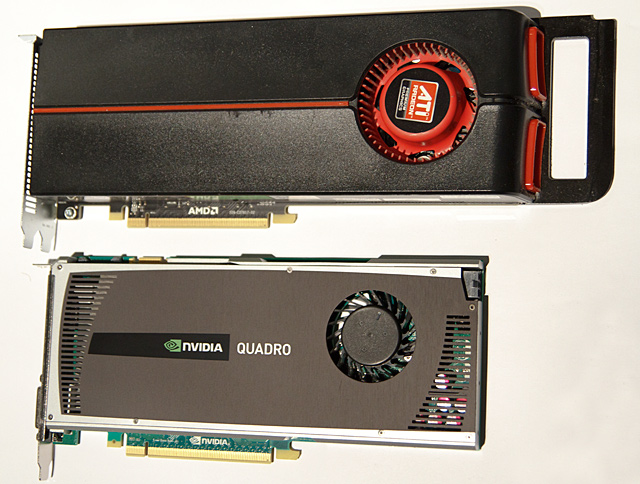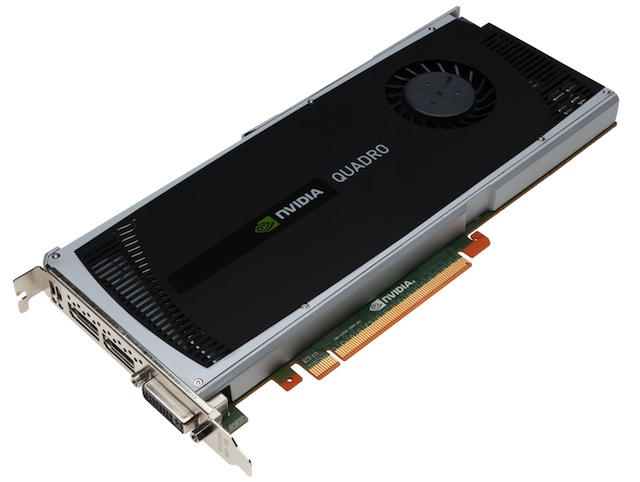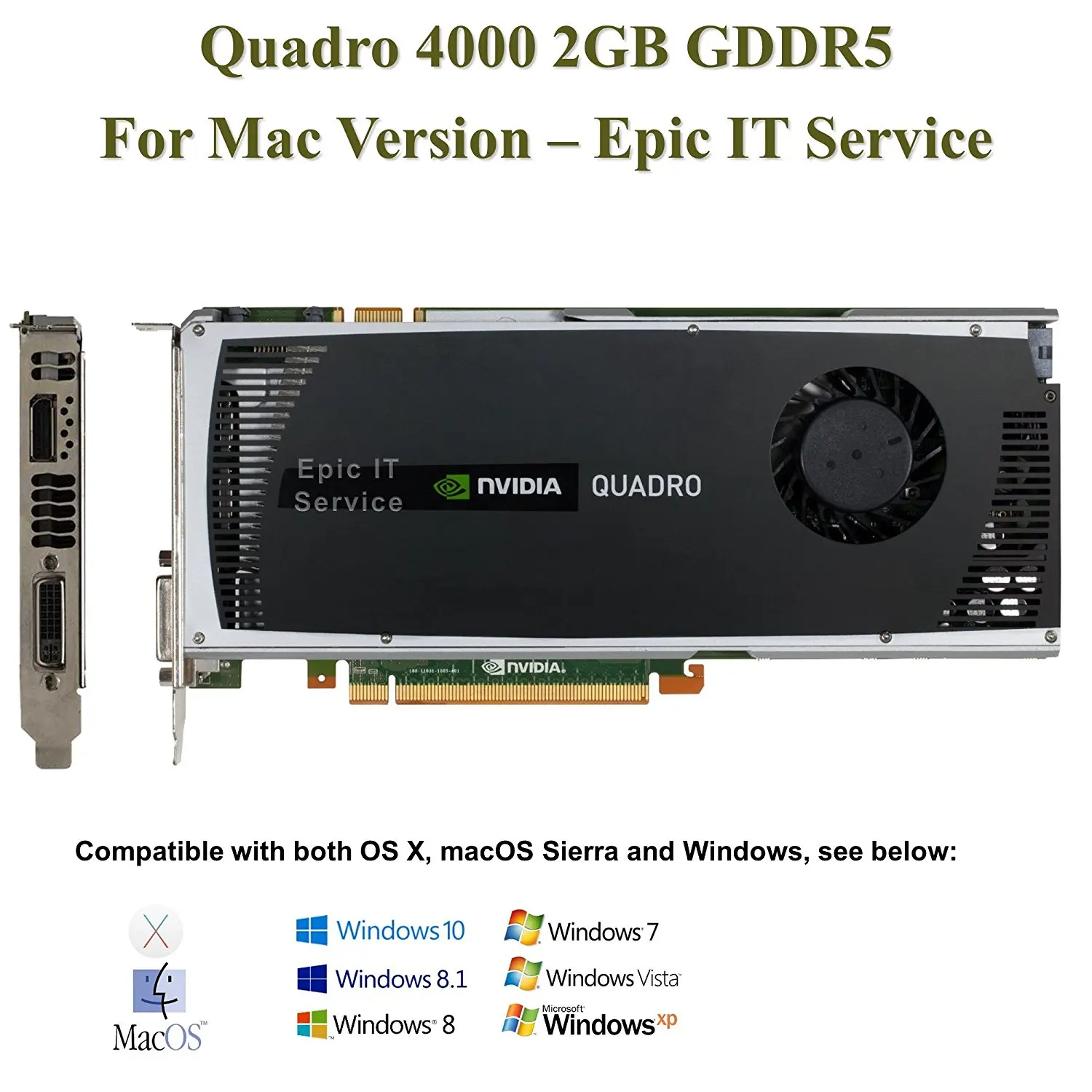Nvidia Quadro For Mac
Release 342.01 is an update from the R340 ODE driver branch, the ‘Optimal Drivers for Enterprise’ [ODE]. ODE branches are dedicated to relatively long term stability for ISV certification, OEMs, and Enterprise customers. View full NVIDIA Quadro NVS 295 specs on CNET.

• Added support for the following GPUs: • VGX K1 • VGX K2 • Added a missing 32-bit compatibility library for libnvidia-opencl.so to the 64-bit Linux installer package. • Fixed a regression in backlight control functionality on some notebook configurations. • Fixed a performance issue with recent Linux kernels when allocating and freeing system memory. • Fixed a bug that sometimes prevented the display device / X screen selection menu from being displayed in nvidia-settings. • Fixed a bug that prevented X driver gamma manipulation from working after a VT-switch on some configurations. • Added the option '--output-file' to nvidia-bug-report.sh to allow specifying a custom filename for the log file.
Nvidia Quadro 4000 For Mac
There is no special method for flashing nvidia in mac pro, just do it in windows rom file is from quadro 4000 mac card, try searching netkas.org for it. Nimco control valve. Note: Quadro FX for Mac or GeForce for Mac must be installed prior to CUDA Driver 418.105 installation Double-click on cudadriver418.105macos.dmg Click Continue on the Installer Welcome screen Click Continue after you read the License Agreement and then click Agree.
- Thanks for the great reply! That driver page lists it's compatible with 'Quadro 4000 for Mac', but doesn't say anything about the PC variant. I just want to make sure that on El Capitan, it's no longer the case that you have to do rom flashing or other weird stuff to a standard PC Quadro 4000 card to make it work on Mac.
- The Quadro 4000 Mac Edition was an enthusiast-class professional graphics card by NVIDIA, launched in June 2011. Built on the 40 nm process, and based on the GF100 graphics processor, the card supports DirectX 12. The GF100 graphics processor is a large chip with a.
- In order to run Mac OS X Applications that leverage the CUDA architecture of certain NVIDIA graphics cards, users will need to download and install the 6.5.18 driver for Mac located here. New in Release 343.01.01f02.
• Fixed a hang when using OpenGL programs with some SLI Mosaic configurations on pre-Fermi GPUs. • Added sections to the 'Supported NVIDIA GPU Products' list for NVS, Tesla, and VGX products.
Note that many Linux distributions provide their own packages of the NVIDIA Linux Graphics Driver in the distribution's native package management format. This may interact better with the rest of your distribution's framework, and you may want to use this rather than NVIDIA's official package. Also note that SuSE users should read the SuSE NVIDIA Installer before downloading the driver. Installation instructions: Once you have downloaded the driver, change to the directory containing the driver package and install the driver by running, as root, sh./NVIDIA-Linux-x86_64-304.64.run One of the last installation steps will offer to update your X configuration file. Either accept that offer, edit your X configuration file manually so that the NVIDIA X driver will be used, or run nvidia-xconfig Note that the list of supported GPU products is provided to indicate which GPUs are supported by a particular driver version. Some designs incorporating supported GPUs may not be compatible with the NVIDIA Linux driver: in particular, notebook and all-in-one desktop designs with switchable (hybrid) or Optimus graphics will not work if means to disable the integrated graphics in hardware are not available.
Ntfs driver for mac. Hardware designs will vary from manufacturer to manufacturer, so please consult with a system's manufacturer to determine whether that particular system is compatible. See the for more detailed instructions.
For people who have Dell T3500/R5500 and anything in that era of computers that use the NVidia Quadro NVS 295 you have download a Windows 10 x64 driver from NVidia.com. I have attached a driver link below however if you wish to obtain it your self you have to go to the driver download page specific options listed below. Product Type: 'Quadro' Product Series: 'Show all Product Series' then select 'Quadro NVS Series' Product: 'Quadro NVS 295' Operating System: 'Windows 10 64-bit' Select the options that are applicable to your use and search.
It should return Driver 342.00 released on 2016.10.27. Yes I did get an error message but I apologize I did not capture it as it was a splash screen and then rebooted several times before allowing me the option to try something else. IE advanced boot options. No I did not try installing in compatibility mode as it was NVidia's driver stating it was for Windows 10 and the Microsoft Update download driver didn't even give me a choice. Since this was my work computer I had to revert back to the original OS installed.
Uploader: Date Added: 13 October 2013 File Size: 61.51 Mb Operating Systems: Windows NT/2000/XP/2003/2003/7/8/10 MacOS 10/X Downloads: 88527 Price: Free* [ *Free Regsitration Required] If anyone has experienced this problem and has an answer to these questions I would appreciate hearing from you. Europe, Middle East, Africa. Motherboard drivers msi. Do not change any jumper setting while the compaq rc410-m motherboard is on.
Warp and Blend are interfaces exposed in NVAPI for warping (image geometry corrections) and blending (intensity and black level adjustment) a single display output or multiple display outputs
Many display applications benefit from combining multiple projectors or displays into one larger display surface. If all the displays are aligned in a grid with no overlap, features like Mosaic make it easy to create a single unified display from multiple physical displays. When the displays are rotated at odd angles or the display surface is an irregular shape, multiple projectors need to overlap, blend together and be mapped or adjusted to the display surface. The Warp and Blend SDK provides an easy way to bring this functionality to any application with minimal performance impact and no incremental latency.
In the example above both warp and blend are used to achieve a seamless, blended picture from two projectors illuminating a curved screen. A standard practice when using multiple projectors is to overlap the seams where each projected image touches another. Since optics and screens are never perfect and overlapping can create hotspots (regions gets twice amount of light) blend is used to adjust the intensity of the overlapping region. Warp is used to modify geometry so that it matches the curve of the projection wall.
Traditionally, warp and blend operations are done with custom hardware using features built into the projector or with direct modifications to an application. The Warp and Blend SDK provides an easy way to bring this functionality to any application with minimal performance impact and no incremental latency.
Warp and Blend is part of NVAPI
NVAPI is NVIDIA's core software development kit that allows direct access to NVIDIA GPUs on windows platforms. Warp and blend is implemented as an interface in NVAPI that programmably exposes warping and intensity adjustment features before the final scanout. Working in conjunction with a supported NVIDIA Display Driver, the warp and blend features works on a single screen, multiple screens and multi-gpu configurations and are available only with NVIDIA Quadro GPUs.
Learn more about NVAPI.
Download Warp and Blend Sample
Download the Warp and Blend programming sample package to get started developing with warp and blend and NVAPI. To download, you must be a member of NVIDIA Developer - DesignWorks.
By clicking the 'Agree & Download' button below, you are confirming that you have read and agree to be bound by the SOFTWARE DEVELOPER KITS, SAMPLES AND TOOLS LICENSE AGREEMENT for use of the SDK package. The download will begin immediately after clicking on the 'Agree & Download' button below.
Join the NVIDIA Developer Program
Nvidia Quadro K5000 For Mac Driver
Get access to the latest software releases and tools and receive notifications and invites to join special developer events, early access programs and educational webinars. The program is free-to-join and open to all developers.
Key Features


- Generate a seamless image on up to 16 displays or projectors with warp and blend using NVIDIA Mosaic Technologies and NVIDIA Quadro Sync (ability to synchronize up to four Quadro GPUs per system).
- Apply warping to any scenario that requires image geometry corrections such as rotation, skew, mirroring, offset, and geometry mapping.
- Adjust intensity and black level in portions of a screen, every pixel if desired.
- Minimal performance impact and no incremental latency.
- Works in single screen, multiple screens and multi-gpu configurations.
| Operating System | Windows 7, 8, 10, Server 2008R2, Server 2012 |
|---|---|
| Dependencies | NVIDIA Quadro 1200 class or higher products with Fermi, Kepler, Maxwell or newer GPUs NVS 810 & 510 Windows Quadro Display drivers 302.82 or newer |
Why do Warp and Blend on the GPU?
Traditionally, warp and blend is integrated into the projector or done using custom hardware appliances which adds performance delay to the display pipeline. It can also be done using software applications but that may not conform to all use cases. Since the pixel information is already available to the GPU, the GPU is the natural place to do this work. GPUs also bring additional benefits to warp and blend:
- GPUs are inherently parallel for fast image processing operations
- Ability to perform transformation in the display pipeline before the pixel get scanned out
- Minimal performance delay to display pipeline compared to external boxes using FPGAs
- Cost effective and easily scalable
Warp and Blend In Action
Immersive VR using a domed screen
The Operational Based vision Assessment (OBVA) Simulator at NASA.
Image courtesy of NASA
Projection mapping onto scale physical models
A 1:5 scale, blank canvas model car with car’s features projected onto the surface of the model to replicate a photo-real, physical object for real-time interaction and customization.
Image courtesy of Christie Digital
Simulator environment with large curved front displays
The PanoLab is a wide-area high realistic projection system for interactive presentations of virtual environments. The half-spherical screen of PanoLab allows the simulation of large visual fields providing an increased degree of immersion. The PanoLab was calibrated using nWarp, part of the ProjectionTools automatic calibration system from domeprojections.com
Image courtesy of Joachim Tesch. Max Planck Institute for Biological Cybernetics.
Multi-projection display walls
Using a matrix of projections projected to a single screen to present a seamless large scale, single image.
Developer Forums
Our forum community is where Developers can ask questions, share experiences and participate in discussions with NVIDIA and other experts in the field.
Check out the forums here.
Resources

Warp and Blend Presentations
Update on Warping Standards
Video
Video Presentation
Video Presentation
Video Presentation
Additional Resources
Nvidia Quadro K5000 For Mac Price
- NVAPI Software Development Kit (Windows only)
- NVAPI Documentation (PDF)